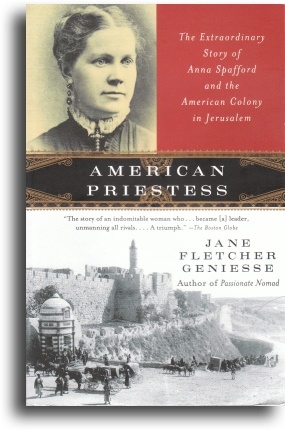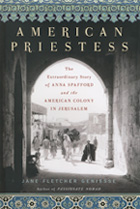Jane Fletcher Geniesse

Anchor Books, 2009 (Paperback)
“Jane Geniesse has proved there is definitely a second act. Her American Priestess follows naturally like another jewel from Passionate Nomad. Her story of Anna Spafford's multi-layered journey from Chicago to Jerusalem and beyond is stunning--impressively researched and beautifully told.”
— Jim Lehrer
For generations, a fabled mansion has been the residence of choice for foreign correspondents, diplomats, pilgrims and spies coming to Jerusalem—but until now, few knew the true story of the palatial establishment that became the American Colony Hotel or its bizarre history of tragedy, religious extremism, emotional blackmail, and peculiar sexual practices.
In Chicago, during the boom years following the Civil War, Horatio Spafford was a prominent lawyer caught up in a mighty wave of Protestant evangelism deluging the nation and drawing millions of citizens to revival tents. Like his well-heeled friends and business associates, Horatio believed the solution to social unrest was to bring the poor and unemployed to Christ. Once these vagrants, newcomers, or labor agitators were converted and “born again” surely all problems would be solved--and it would be unnecessary to address the inequities that were actually behind angry strikers objecting to an unbridled, exploitive capitalism.
Horatio's lovely, blue-eyed wife Anna, the daughter of a Norwegian immigrant, was delighted to have moved into a better social class with her marriage to the handsome, prosperous attorney. Initially indifferent to religious pieties—as a young girl she had suffered a disturbing encounter with a supposedly “religious” man—events soon changed her mind. The devastating Chicago Fire of 1871 nearly ruined the Spaffords and flung Anna into a nervous depression which she could not shake. For the first time, she began listening seriously to the firey evangelist, Dwight Lyman Moody, whose powerful sermons were fueling the revivalist movement.
When Horatio promised her a salutary year in Europe, she did not know that he was borrowing heavily to fund such extravagances. Glad to leave Chicago, Anna and her four daughters boarded the luxury liner, Ville du Havre. Incredibly, on a beautiful starry night, the ship was rammed mid-Atlantic by an iron sailing vessel and sank in twelve minutes. All four children drowned; Anna alone was saved.
The tragedy stunned Horatio and Anna, and profoundly challenged their faith. Worse, in the heated religious atmosphere, fellow Chicagoans wondered what the Spaffords might have done for God to punish them so severely. Horatio abruptly abandoned the Presbyterian church on Fullerton Avenue in which he had been a pillar, and founded one of his own, offering some rather bizarre tenets.
With Anna's support, the couple soon gathered hundreds of devotees eager to believe their prophecy that the Second Coming was imminent. In 1881, events gathered into a “perfect storm” of trouble. Horatio's profligate financial dealings had come to light, and creditors and journalists were at their door. Anna received a timely "message from God" that they must sail immediately for Jerusalem. The Messiah, she announced, was about to alight on the Mount of Olives.
Accompanied by a handful of followers, the group departed Chicago to board a ship for the Holy Land. No sooner had they settled in Jerusalem than the U. S. Consul and the established Christian missionaries declared them heretics and whispered of scandal and sexual deviance. Yet Muslims and Jews admired their unflagging care of the sick and the needy, and Jews were intrigued with their advocacy of a Jewish Return to Zion according to the Biblical prophecies. When Horatio died, Anna assumed leadership, shocking even her adherents by abolishing marriage and established a dictatorship that was not always benevolent. Ever dogged by controversy yet praised and admired by many, she and her followers actively participated in the titanic upheavals that eventually formed the modern Middle East.
Thoroughly researched and a compelling read, American Priestess provides a fascinating exploration of the seductive power of evangelicalism and raises questions about the manipulation of religion to serve personal goals. A powerful narrative called by the Boston Globe “a triumph,” while the New York Times reviewer commented, “I'd love to buy the film rights,” the story of the Anna's colony sweeps through the dramatic collapse of the Ottoman Empire, the establishment of the British Mandate, and finally the founding of Israel where Anna’s house in East Jerusalem, now the American Colony Hotel, stands as an exemplar of neutrality as well as beauty and comfort, despite its turbulent history.



